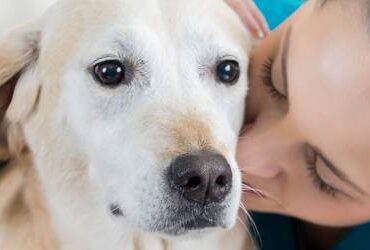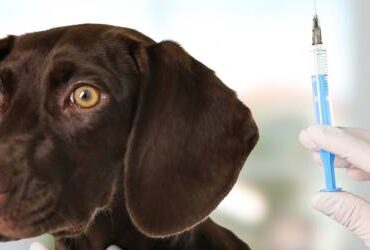
Addison’s Disease In Dogs
Hi everyone, and thank you for joining me on this episode of Val Talk’s Pets. On this episode, I am going to explore Addison’s disease in dogs, also known as […]
 play_arrow
play_arrow
Common Dog Myths – The Story Behind Them Val Cairney

 play_arrow
play_arrow
CBD OIL and Pets Val Cairney

Hi everyone and thanks for joining me on this episode of Val Talk’s Pets. This episode was inspired by a rather interesting resurgence of a particular question and that is, do you have CBD oil for dogs? Hmm? It sounds like the interest in CBD oil and its reported benefits is on the rise again. So, let’s talk CBD oil for pets.
According to www.healthline.com, CBD is a “non-psychoactive compound in cannabis that may help manage health conditions, improve mood and reduce pain.” CBD stands for “Cannabidiol. What this means is that a “Cannabinoid” from a cannabis plant is extracted and then mixed with a carrier oil to make CBD oil. Here is what is interesting. According to verywellhealth.com, “CBD is extracted from cannabis plants (for example) Cannabis indica, Cannabis sativa, and Cannabis ruderalis). However, the hemp plant Cannabis ruderalis, typically contains higher quantities of CBD. To separate CBD from tetrahydrocannabinol, THC, “CBD oil should not contain more than 0.3% THC.” For this reason, people often think or assume CBD is safe. And as verywellheath, points out, “CBD oil is different from hemp oil. Hemp oil is processed differently (by) pressing hemp seeds and typically contains no CBD.” CBD can be sourced from the two varieties of cannabis plants, marijuana and hemp. If you are looking for CBD for a pet, you must make sure it is the variety from hemp because of the limited THC.
Now,

According to bestfriendspetcare.com, “When cannabinoids like CBD are introduced into the body, they interact with something called the endocannabinoid system.” The endocannabinoid system is “like the immune system or the central nervous system.” “The endocannabinoid system is made up of cannabinoid receptors called CB1 and CB2.” CB1 receptors include, the brain, lungs, vascular system, muscles, gastrointestinal tract, reproductive organs, immune system, liver, bone marrow and pancreas. CB2 receptors include the spleen, bones, immune system, liver, bone marrow and pancreas. The CBD that enters the body, interacts “with the endocannabinoid system either by binding directly to and activating the CB1 and CB2 receptors. These interactions are what results in the potential health benefits an animal can experience…” I find most pet parents look into CBD for relieving stress, anxiety or pain in pets. Senior dogs that are experiencing arthritis and mobility pain can really concern pet parents. The daily walk can become difficult or hearing your pet yelp when getting up is heartbreaking for a pet parent. Also, some dogs and cats have been through the gambit of medication and techniques to try and deal with separation anxiety or cats that just can’t get along, thunderstorms, fireworks, you name it, pet parents look to CBD to see if they finally have an answer.
Many pet parents find that CBD has a positive effect on their pets depending on condition. Side effects are rare but some may experience thirst, lethargy and if you overdose the pets blood pressure may go too low so it is important to dose accurately. CBD for pets comes in tinctures, which are little bottles with a dropper that contain the CBD within a carrier. Some products may use coconut oil as the carrier or hemp seed. Both of these oils have health benefits as well and if possible looking for organic coconut and hemp seed oil is a good idea. The tincture method is often recommended because of the ability to be accurate with dosage. If your pet is opposed to something being put in their mouth you can put the dosage in food. But, some pets can turn their nose up at anything put in their food, so there are treats available as well.

Okay, now when it comes to CBD, according cbd-oil-canada.co, “CBD is not approved by major veterinary regulation boards, which means that most veterinarians cannot officially recommend or prescribe CBD” in Canada. Now, this is not to say you cannot discuss the usage with your veterinarian, you can, but just be aware that in Canada, they can’t officially recommend. When it comes to getting CBD products in pet specialty, petplanethealth.com explains, “In Canada, Hemp Oil and Hemp Seed Oil are the only products allowed to be sold. There are currently no approved CBD drugs for animals, meaning there is no legal pathway to obtain these products for animals in Canada. Unfortunately, there are a few retail and private individuals violating the law and selling these products.” I hear this occasionally where someone asks for CBD and then says, well so and so sells it. All I can say is, the legislation can be a bit ambiguous. For example, you are allowed to sell CBD treats as long as they are under the 0.3% THC level. However, this is for human consumption and therefore does not fall into the legislation for animals. The question begs,
The short answer is yes, but the caveats are important. CBD will work the same on a human or an animal based on the receptors, however, the CBD must come from hemp. As holistapet.com points out, “products derived from the marijuana variety of cannabis however, are NOT safe for animal consumption as they typically contain high levels of THC and can be toxic to animals.” In my episode on safety and toxic things to avoid with animals, cannabis smoke, and edibles were high on my list as any consumption through eating a cannabis edible or inhaling cannabis smoke, can seriously effect an animal to the point of emergency care.
The other issue with using human CBD with a pet is the dosage. If someone were to obtain human CBD for the purpose of giving it to their dog or cat, they would have to do some very thorough research on the proper dose. Plus, the carrier used or other ingredients in the product would have to be scrutinized to make sure that there were no toxic ingredients to animals that would not be an issue to a human. For these reasons, it is highly recommended to stick to pet CBD and to make sure that the source is reputable and inspection of the product is done before giving any to a pet. It becomes apparent now why Canada is being very cautious about the sale of CBD for pets in retail.

In term of cats, CBD for pets is also something that can be looked in to. Rawznaturalpetfood.com recommends, “2-4 mg of CBD per pound of cat to start.” They point out that starting small is the best approach. Waiting 15 to 45 minutes for results is recommended as well. There are good charts to help you with dosing. But, again the same cautions apply to cats as with dogs. CBD for cats can help with anxiety between two cats, pain, peeing where they shouldn’t or marking or not using the litter for some reason.
So let’s look at the bottom line with regards to CBD and dogs and cats. CBD can address several health issues a pet may be experiencing, from pain, to stress to anxiety. Side effects could include extra thirst, diarrhea, lethargy and possibly reduced appetite. Most people that are looking to use CBD have tried just about everything, but if the pet parent has not, I would strongly recommend trying other approved products for calming or pain before going the CBD route.
There are cautions when it comes to CBD for pets. VCA Canada points out that, “CBD products are poorly regulated and may be contaminated or adulterated with THC above the legal limit for hemp-based products.” Yes, there are some positives for the use of CBD but there is limited research and lack of approval. At this point, veterinarians in Canada cannot prescribe CBD. There may be a slight loophole where a vet could prescribe a human CBD but I have not heard of any vets taking that risk. And I am fully aware that some pet parents are ordering on line from distributors and or getting the products out of country. But the issue with tainted product comes into play and personally I would not take the risk. As stated, at this point there is no CBD drugs approved for animals in Canada. So be cautious if you see it for sale.
I know the retail restrictions can be frustrating for someone with a dog or cat in pain, or palliative or losing their minds during thunderstorms, but the regulations are there for a reason. However, if the consideration to obtain CBD for a pet is still something that someone is going to do, then research is the key. You need to know exactly what is in the product, what is the carrier, where is it made? And I think looking into the company as well is a good idea because you want to know their integrity and efficacy and transparency. And you know, just because a vet in Canada cannot prescribe CBD, that doesn’t mean you can’t have the conversation with your vet about CBD.
So, again and as always, do your research because as I say, knowing is caring.

Tagged as: Cannabidiol, CBD Oil for Pets.
Hi everyone, and welcome to Val Talk’s Pets, the forum for pet parents and enthusiasts alike. So, I have been working in the pet industry now for almost 10 years and, on a daily basis, I handle a lot of issues and questions arising from pet parents. I am not a veterinarian but I do have certifications in Canine, Feline, Small Animal, Fish and Herptile and Avian Health and Nutrition from the University of California, Davis Extension, the Vet College.

Val Cairney September 8, 2023
Hi everyone, and thank you for joining me on this episode of Val Talk’s Pets. On this episode, I am going to explore Addison’s disease in dogs, also known as […]

Val Cairney May 17, 2024

Val Cairney April 19, 2024
For the price of a coffee, or more if you are feeling generous, you can help keep this podcast going & growing. Please visit my ko-fi page to make a donation. Thanks!

all rights reserved - Val Talks Pets - 2020
Post comments
This post currently has no comments.